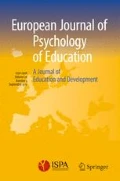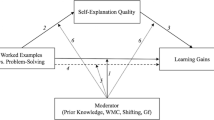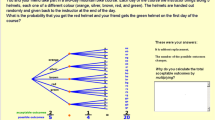Abstract
Recent research has shown that learning from worked-out examples is of major importance for initial skill acquisition in well-structured domains such as mathematics. However, only those learners who actively process the presented examples profit noticeably from this learning mode. Specifically, the learning outcomes depend on how well the learners explain the solution steps presented in the examples to themselves (‘self-explanation effect”). In a series of studies on learning mathematics from examples, learners’ spontaneous self-explanations and instructional means used to encourage self-explanations were investigated. In this research, the following main findings were obtained. Most learners were rather passive with respect to their spontaneous self-explanations. Among the active and successful learners, two subgroups employing different self-explanation styles could be identified. With regard to the instructional means used to induce effective example processing, it turned out that to employ “learning by teaching” in order to stimulate explanation activities was of very limited use. Attempts to directly train for or elicit certain types of self-explanations were more successful. However, even in the latter case, self-explanations had inherent deficits (e.g., proneness to errors). Thus, we sought to design learning arrangements that try to integrate self-explanations with well-timed and well-adapted instructional explanations (e.g., from tutors) in order to enhance students’ problem-solving skills.
Similar content being viewed by others
References
Alexander, P.A. (1997). Mapping the multidimensional nature of domain learning: The interplay of cognitive, motivational, and strategic forces.Advances in Motivation and Achievement, 10, 213–250.
Bereiter, C., & Scardamalia, M. (1989). Intentional learning as a goal of instruction. In L.B. Resnick (Ed.),Knowing, learning, and instruction (pp. 361–392). Hillsdale, NJ: Erlbaum.
Bielaczyk, K., Pirolli, P., & Brown, A.L. (1995). Training in self-explanation and self-regulation strategies: Investigating the effects of knowledge acquisition activities on problem solving.Cognition and Instruction, 13, 221–252.
Brown, A.L., & Kane, M.J. (1988). Preschool children can learn to transfer: Learning to learn and learning from examples.Cognitive Psychology, 20, 493–523.
Chi, M.T.H., Bassok, M., Lewis, M.W., Reimann, P., & Glaser, R. (1989). Self-explanations: How students study and use examples in learning to solve problems.Cognitive Science, 13, 145–182.
Chi, M.T.H., DeLeeuw, N., Chiu, M.H., & LaVancher, C. (1994). Eliciting self-explanations improves understanding.Cognitive Science, 18, 439–477.
Dweck, C.S., & Leggett, G.L. (1988). A social-cognitive approach to motivation and personality.Psychological Review, 95, 256–273.
Ericsson, K.A., & Simon, H.A. (1993).Protocol analysis. Verbal reports as data (Revised edition). Cambridge, MA: MIT Press.
Friedrich, H.F., & Mandl, H. (1992). Lern-und Denkstrategien — ein Problemaufriß [Learning and thinking strategies — an introduction to the topic]. In H. Mandl & H.F. Friedrich (Eds.),Lern- und Denkstrategien: Analyse und Intervention (pp. 3–54). Göttingen: Hogrefe.
Hiebert, J. (Ed.). (1986).Conceptual and procedural knowledge: The case of mathematics. Hillsdale, NJ: Erlbaum.
Lovett, M.C. (1992). Learning by problem solving versus by examples: The benefits of generating and receiving information. InProceedings of the Fourteenth Annual Conference of the Cognitive Science Society 1992 (pp. 956–961). Hillsdale, NJ: Erlbaum.
Neber, H. (1995). Explanations in problem-oriented cooperative learning. In R. Olechowski & G. Khan-Svik (Eds.),Experimental research on teaching and learning (pp. 158–166). Frankfurt/Main: Lang.
Neuman, Y., & Schwarz, B. (1998). Is self-explanation while solving problems helpful? The case of analogical problem solving.British Journal of Educational Psychology, 68, 15–24.
Pirolli, P., & Recker, M. (1994). Learning strategies and transfer in the domain of programming.Cognition and Instruction, 12, 235–275.
Reimann, P. (1997).Lernprozesse beim Wissenserwerb aus Beispielen: Analyse, Modellierung, Förderung [Learning process in knowledge acquisition from examples. Analysis, modeling, enhancement]. Bern, CH: Huber.
Renkl, A. (1995). Learning for later teaching: An exploration of mediational links between teaching expectancy and learning results.Learning and Instruction, 5, 21–36.
Renkl, A. (1996). Lernen durch Erklären — Oder besser doch durch Zuhören? [Learning by explaining, or better, by listening?].Zeitschrift für Entwicklungspsychologie und Pädagogische Psychologie, 28, 148–168.
Renkl, A. (1997a, March).Learning by explaining, or better, by listening? Paper presented at the Annual Meeting of the American Educational Research Association in Chicago.
Renkl, A. (1997b). Learning from worked-out examples: A study on individual differences.Cognitive Science, 21, 1–29.
Renkl, A. (1997c). Lernen durch Erklären: Was, wenn Rückfragen gestellt werden? [Learning by explaining: What if questions were asked?].Zeitschrift für Pädagogische Psychologie, 11, 41–51.
Renkl, A. (1997d).Lernen durch Lehren. Zentrale Wirkmechanismen beim kooperativen Lernen [Learning by teaching. Central mechanisms of cooperative learning]. Wiesbaden: DUV.
Renkl, A. (1998, April).Learning by explaining in cooperative arrangements: What if questions were asked? Paper presented at the Annual Meeting of the American Educational Research Association in San Diego, California.
Renkl, A., & Helmke, A. (1992). Discriminant effects of performance-oriented and structure-oriented mathematics tasks on achievement growth.Contemporary Educational Psychology, 17, 47–55.
Renkl, A., Mandl, H., & Gruber, H. (1996). Inert knowledge: Analyses and remedies.Educational Researcher, 31, 115–121.
Renkl, A., Stark, R., Gruber, H., & Mandl, H. (1998). Learning from worked-out examples: The effects of example variability and elicited self-explanations.Contemporary Educational Psychology, 23, 90–108.
Renkl, A., Stark, R., Gruber, H., & Mandl, H. (in press). Förderung des Wissenstransfers im Bereich des kaufmännischen Rechnens durch Anleitung zur Selbsterklärung und multiple Beispiele [Fostering knowledge transfer in the domain of commercial arithmetic by training self-explanations and employing multiple examples]. In L.-M. Allsch (Ed.),Externale und internale Beschreibungen. Anwendungen empirisch-pädagogischer Forschungsmethodik. Münster: Waxmann.
Stark, R. (1998).Lernen mit Lösungsbeispielen. Der Einfluß unvollständiger Lösungsschritte auf Beispielelaboration, Motivation und Lernerfolg [Learning by worked-out examples. The impact of incomplete solution steps on example elaboration, motivation, and learning outcomes]. Unpublished dissertation. University of Munich, Germany.
Stark, R., Graf, M., Renkl, A., Gruber, H., & Mandl, H. (1995). Förderung von Handlungskompetenz durch geleitetes Problemlösen und multiple Lernkontexte [Fostering action competence through guided problem-solving and multiple learning contexts].Zeitschrift für Entwicklungspsychologie und Pädagogische Psychologie, 27, 289–312.
Steiner, G.F., & Stoecklin, M. (1997). Fraction calculation — A didactic approach to constructing mathematical networks.Learning and Instruction, 7, 211–233.
Sweller, J. (1994). Cognitive load, learning difficulty, and instructional design.Learning and Instruction, 4, 295–312.
Sweller, J., & Cooper, G.A. (1985). The use of worked examples as a substitute for problem solving in learning algebra.Cognition and Instruction, 2, 59–89.
VanLehn, K. (1996). Cognitive skill acquisition.Annual Review of Psychology, 47, 513–539.
Webb, N.M. (1991). Task-related verbal interaction and mathematics learning in small groups.Journal for Research in Mathematics Education, 22, 366–389.
Webb, N.M. (1992). Testing a theoretical model of student interaction and learning in small groups. In R. Hertz-Lazarowitz & N. Miller (Eds.),Interaction in cooperative groups. The theoretical anatomy of group learning (pp. 102–119). Cambridge, UK: Cambridge University Press.
Zhu, X., & Simon, H.A. (1987). Learning mathematics from examples and by doing.Cognition and Instruction, 4, 137–166.
Author information
Authors and Affiliations
Corresponding author
Additional information
Most of the research reported in this article was funded by the “Deutsche Forschungsgemeinschaft” (Re 1040/1–1, Re 1040/1–2, Ma 978/5–2).
Rights and permissions
About this article
Cite this article
Renkl, A. Learning mathematics from worked-out examples: Analyzing and fostering self-explanations. Eur J Psychol Educ 14, 477–488 (1999). https://doi.org/10.1007/BF03172974
Received:
Revised:
Issue Date:
DOI: https://doi.org/10.1007/BF03172974




